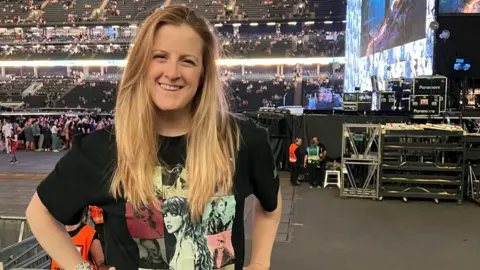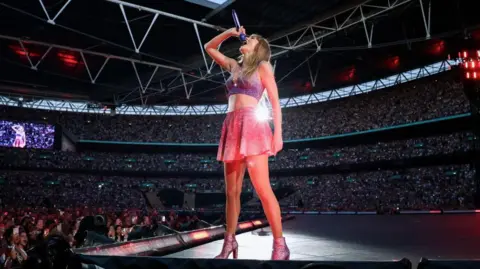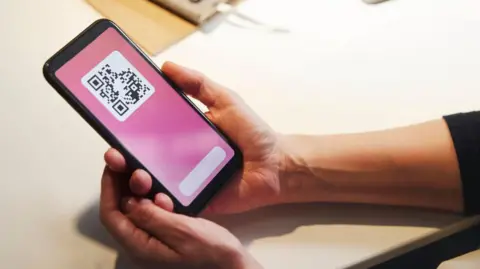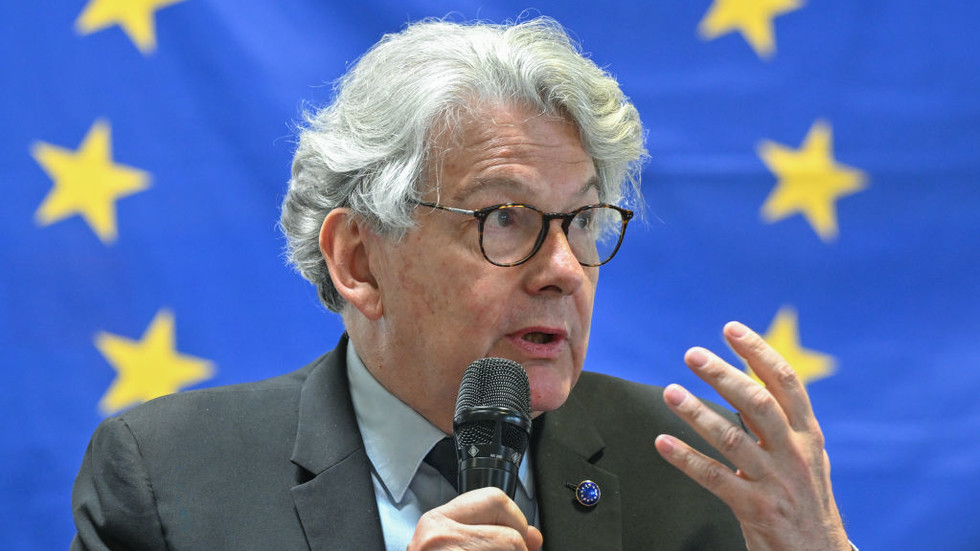
 Jacki Thrapp
Jacki Thrapp
American Jacki Thrapp found that it was cheaper to fly to Europe to see Taylor Swift
For Nashville native Jacki Thrapp flying to Europe this summer to see her idol Taylor Swift perform live was a “no brainer”.
With the cheapest tickets for the remaining US dates of Swift’s continuing Eras Tour now costing $2,500 (£2,000) on the resale market, up from their face value of $49, some American fans realised that it would be cheaper for them to fly across the Atlantic to catch one of the European shows instead.
So back in May, Jacki went to see Swift perform twice in Sweden, with each ticket costing her less than $200.
“Americans are paying so much money, and a lot of Taylor Swift fans are people in their 20s and 30s,” says the 32-year-old. “We're paying so much money to see her in the US when a lot of us still can't even afford a house.”
Although Jacki bought two Swedish tickets on the secondary market, the mark-up of the most expensive was only around double its face value. This is said to be because buying resold tickets is not an established thing to do in Sweden, unlike in the US and UK.
In other European countries, such as Germany, tickets cannot be resold at more than 25% of their face value. Meanwhile, some nations go even further. Italy, Portugal and the Republic of Ireland all have laws in place that prevent concert tickets being sold above their original price.
In the UK and the US the price of re-sold tickets can currently be as high as people are willing to pay. In April, 250 musical artists, including Billie Eilish and Cyndi Lauper, signed an open letter that attacked "predatory resellers", and called the current ticking system "broken".
The situation may change for the better in the UK in the next few years, as the Labour Party, which forms the new government, said in March that it planned to cap the resale price of tickets.
Yet laws preventing excessive pricing on the secondary market do not stop two key issues – touts getting their hands on excessive amounts of tickets in the first instance, and the risk of people buying counterfeit tickets or being scammed.
The latter is said to have affected hundreds of Taylor Swift fans who tried to buy tickets for her concerts in the UK this summer.

 Getty Images
Getty Images
Tickets for Taylor Swifts' concerts are a must-have for many this summer
Asher Weiss, chief executive of ticketing start-up Tixologi, believes that technology is the solution, particularly AI.
“People [touts] will buy a ticket and list it on multiple marketplaces for secondary sale,” he says. “And then even if it sells on one, they won't take it down off the other one.
“So multiple people end up with the same ticket, trying to get in,” explains Mr Weiss, whose firm is based in Los Angeles.
To prevent people buying excessive numbers of tickets, he says that Tixologi’s AI “will be able to flag people making multiple purchases from the same IP address as unusual purchasing behaviour”.
“That would prevent those bad actors, and protect the true fans and customers,” adds Mr Weiss.
His firm is also able to ensure that only one copy of a ticket can ever exist. It does this by using blockchain, the technology that underpins cryptocurrencies. This prevents duplication.
Tixologi’s electronic tickets also have a rotating QR code that is said to be extremely difficult to copy, so that fake ones are instantly spotted when scanned. And a venue or artist can select a function called “disable transfers”, which prevents a user from emailing the ticket to someone else. This makes them much harder to re-sell.

 Getty Images
Getty Images
Tixologi’s electronic tickets have a rotating QR code to prevent them being copied
UK ticketing company Seat Unique is working with London’s Wembley Stadium to sell hospitality tickets for Taylor Swift’s tour. She returns to the stadium for five shows in August, following three there in June.
“It is probably the most popular event I’ve seen in 15 years,” says Robin Sherry, Seat Unique’s founder and chief executive.
The company specializes in allowing venues and artists to sell their tickets via dynamic pricing. What this means is that the price is allowed to go up, and down, according to demand.
The idea is that the venue and artists sell the tickets directly, and therefore get the additional income if prices rise, instead of that money going to sellers on the secondary market.
To set the dynamic price Seat Unique is now using AI to constantly monitor demand and automatically respond to it.
“It’s ultimately about keeping tickets in the hands of fans not scalpers,” says Mr Sherry, who also works with sports clubs and organisations.
He adds that AI also has the ability to transform the marketing of concerts and other events, with adverts specifically targeted at individuals based on learning what they are interested in.
“I always jokingly say, AI will know what events you want to go to before I do,” he adds, saying that this will be “revolutionary in an industry that has been slow to modernise”.
While AI is starting to change how we are able buy tickets to concerts and other events, it is also beginning to appear on the stage.
In November a new AI-powered hologram of Elvis Presley will be performing live in London.
The creator of the Elvis Evolution production, Andrew McGuiness, says the hologram is so lifelike that it will be “less like Abba Voyage and more like time travel”.
But whether AI will be the answer for fans like Jacki Thrapp remains to be seen. "This was the first time I've ever left America to see one of my favourite artists, but there has to be a better way to do this,” she says.
Both Seat Unique and Tixologi hope that better way will be delivered by advances in AI.

 1 month ago
12
1 month ago
12










 English (US) ·
English (US) ·